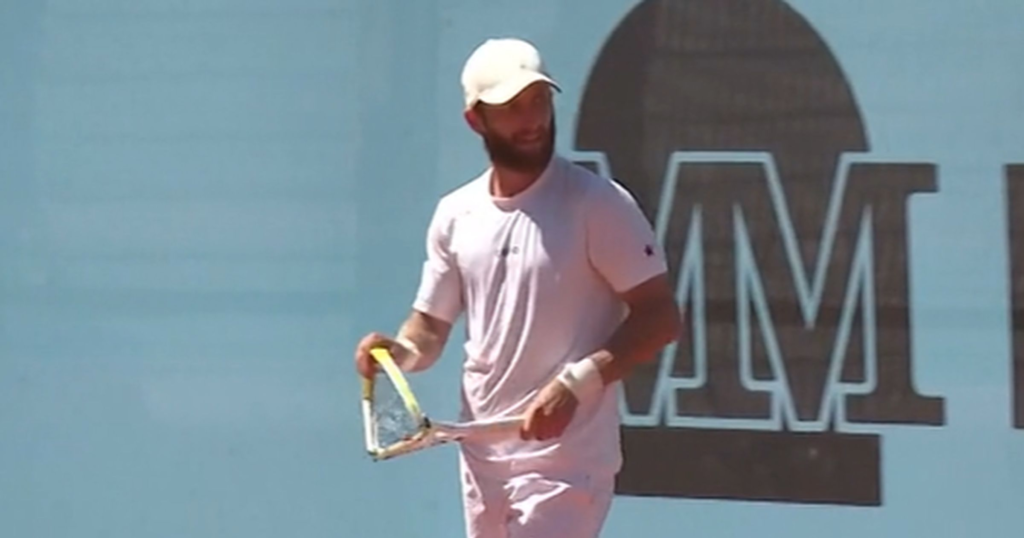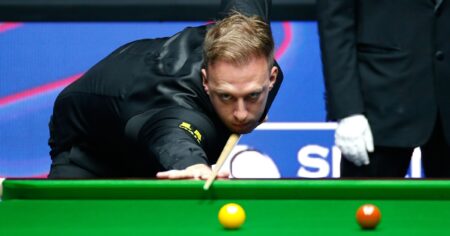Tennis, often celebrated for its physical rigor and mental fortitude, can evoke a myriad of emotions even amongst the sport’s most seasoned players. Despite advanced skills and experience, many athletes find themselves grappling with frustration during intense matches. In this context, French tennis player Corentin Moutet offers a prime example of how emotional turbulence can manifest in high-stakes scenarios, as demonstrated during his first-round encounter at the Madrid Open against Harold Mayot.
During the match, Moutet experienced a series of emotional outbursts that culminated in a dramatic display of frustration when he found himself struggling both physically and mentally. After dropping the first set 3-6 and trailing 2-3 in the second, he became visibly annoyed, culminating in a striking incident where he smashed his racquet against the court in a moment of exasperation. This incident wasn’t merely a fleeting moment of anger; it was the tipping point that led to an unexpected decision.
The 26-year-old athlete, known for his competitive spirit, picked up the broken pieces of his racquet, ostensibly in search of a replacement, but instead walked over to the umpire. In a surprising turn of events, he shook the umpire’s hand to signal his retirement from the match. This abrupt withdrawal was met with confusion and disapproval from the Madrid crowd, whose reaction ranged from astonishment to boos and jeers, indicating their discontent with how the match had unfolded.
Initially, the reasoning behind Moutet’s early retirement remained unclear. However, he took to social media shortly after his departure to shed light on the situation, revealing that he had been experiencing significant back pain. “I went to do an MRI directly after my match; I’m still waiting for the result,” Moutet stated on X, expressing his disappointment in his performance and revealing a level of vulnerability that resonates deeply within competitive sports. He conveyed that while he had hoped to compete, the severity of his injury rendered him unable to perform at his usual level. Moutet concluded with a gracious nod to his opponent, wishing him well for the remainder of the tournament.
Throughout the match, Moutet exhibited clear signs of frustration, particularly evident in interactions with spectators. At one point, he was heard telling fans, “Leave if you’re not happy. Leave the stadium; there are plenty of courts,” a reflection of his emotional state and the pressure he felt. The incident was further exacerbated by a code violation and subsequent point penalty for his racquet destruction, highlighting the often precarious balance between emotional expression and maintaining sportsmanship standards within tennis.
On the other side of the court, Harold Mayot capitalized on Moutet’s retirement, marking his first victory in a WTA 1000 event. Mayot’s next challenge will be against Sebastian Korda in the following round.
As tennis enthusiasts look forward to other significant events on the calendar, attention turns to the upcoming French Open in 2025, in which promising matchups are anticipated. The competition will be broadcast live in the UK on platforms like TNT Sports and discovery+. Analysts and experts will offer extensive coverage from Roland-Garros, fortifying the viewing experience with insights from both on-site and studio discussions.
Carlos Alcaraz, the reigning champion, faces a challenging defense of his title as he contends with formidable rivals, including Novak Djokovic, who aims to secure a record-breaking 25th Grand Slam title, and Alexander Zverev, eager to progress beyond last year’s final. Additionally, hope is carried by British representation, with Jack Draper eyeing his first advancement past the opening round.
On the women’s side, Iga Swiatek, a four-time French Open victor, is favored to secure another title, but faces strong competition from world No. 1 Aryna Sabalenka and past finalists like Coco Gauff and others. As anticipation builds for the tournament, it is clear that the upcoming matches will not only showcase skill but also the emotional battles that are an intrinsic aspect of tennis at this elite level.











